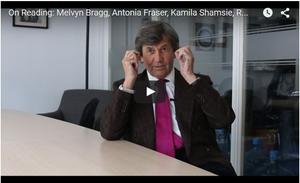I think of myself as being essentially a reader. As you are aware, I have ventured into writing; but I think that what I have read is far more important than what I have written. For one reads what one likes--yet one writes not what one would like to write, but what one is able to write. --Jorge Luis Borges
Later this month, The Pleasure of Reading: 43 Writers on the Discovery of Reading & the Books that Inspired Them will be released by Bloomsbury USA. Edited by Antonia Fraser and Victoria Gray, the book, first published in 1992 to mark the bicentenary of WH Smith, was reissued with additional contributors as a paperback in the U.K. earlier this year.
In her essay for the anthology, Kamila Shamsie observes: "Now my reading life covers much wider ground than it did in childhood when writers such as C. S. Lewis and J. M. Barrie simultaneously opened up the universe and circumscribed it--from Tolstoy and Toni Morrison to Ali Smith and Juan Gabriel Vásquez the world sits on my bookshelf. But although I recognize the richness and breadth of my adult library, I miss the deep pleasures of childhood reading, the intensity which sent me back to books--and not just the most loved ones--over and over again."
Sometimes a confession is in order. Here's mine: I have a complicated relationship with the concept of reading for pleasure. Because I "read for a living," sometimes I have to remind myself that there was a long period in my life when I read strictly for pleasure, for enlightenment, for amusement, for solace, for the hell of it. Although this does still happen, after all these years I've sacrificed a little something almost indefinable. I do get pleasure from reading, but when I open a new book, a now instinctive set of goals and expectations cloud my idealism, if that's what it is.
Often I read books people ask me to read. Or I read with a nagging corner of my brain whispering, "Will this sell?" Or I read the surface of a book to get through it just to be able to say "been there, read that." I worry sometimes that even though I encounter good books regularly, I may have lost some of the pleasure principle.
"People who read regularly for pleasure have greater levels of self-esteem, are less stressed, and can cope better with difficult situations than lapsed or non-readers," the Bookseller reported earlier this year. So there's that. But reading for pleasure isn't as simple as it sounds.
In a New Yorker essay last year, Rebecca Mead recalled: "It's a common and easy enough distinction, this separation of books into those we read because we want to and those we read because we have to, and it serves as a useful marketing trope for publishers, especially when they are trying to get readers to take this book rather than that one to the beach. But it's a flawed and pernicious division.... [T]here are pleasures to be had from books beyond being lightly entertained. There is the pleasure of being challenged; the pleasure of feeling one's range and capacities expanding; the pleasure of entering into an unfamiliar world, and being led into empathy with a consciousness very different from one's own; the pleasure of knowing what others have already thought it worth knowing, and entering a larger conversation.... There's pleasure in ambition, too."
For the past few years, I've found the best way for me to "read for pleasure" is a meditative, almost ceremonial morning read. With my first cup of coffee, I also sip from a book--sometimes old and sometimes new. I may read a few pages or a chapter or even the same page a half-dozen times.
This morning, I read: "Through writing what I had thought would be a very short prologue in a place and time I didn't know at all, I discovered the pleasure and deeply satisfying challenge of writing yourself from ignorance into familiarity rather than mining the stories you'd lived your whole life. I didn't immediately realize that I was severing the cord which had connected the most essential part of me--the writerly part--to the country of my birth and upbringing."
The passage is from another essay by Kamila Shamsie, published in the slender yet powerful anthology 1914: Goodbye to All That--Writers on the Conflict Between Life & Art. Reading those words was in itself a "deeply satisfying challenge," even if I was simply exercising my right to a quiet morning read, with a mug of coffee... for pleasure. --Robert Gray, contributing editor (column archives available at Fresh Eyes Now)

